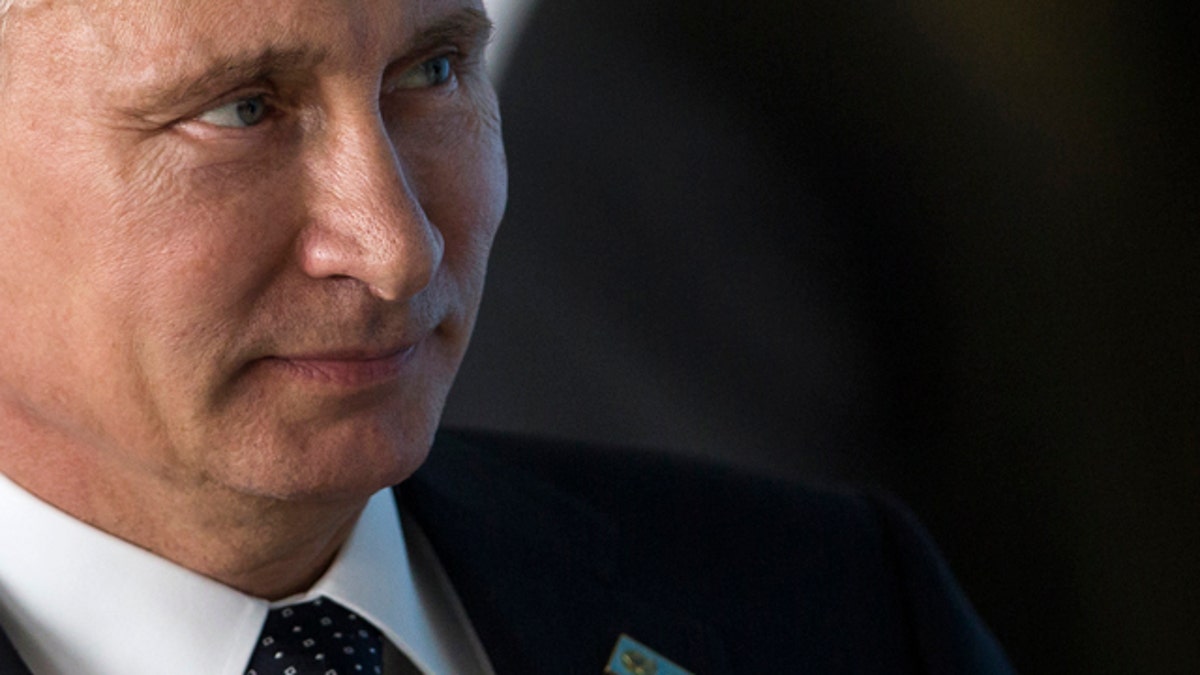
Russian President Vladimir Putin has denied any Kremlin role in the downing of the plane. (AP)
Russia reacted strongly Thursday to new unilateral sanctions announced the day before by President Barack Obama, with a spokesman for the country's Foreign Ministry decrying what it claimed were "bullying" tactics by Washington.
"We consider the new round of American sanctions against Russia as a primitive attempt to take vengeance for the fact that events in Ukraine are not playing out to the tune of the script of Washington," the Ministry said in a statement.
Earlier Thursday, Russian President Vladimir Putin said in televised comments that the sanctions are "driving into a corner" relations between the two nations as well as the interests of American companies and "the long-term national interests of the U.S. government and people."
Putin warned Washington that the sanctions will backfire against American companies working in Russia.
Prime Minister Dmitry Medvedev in televised remarks said the sanctions are throwing Russia's relations with the West "back to the 1980s" and added that Russia "will have to pay more attention to military and security spending."
The penalties announced by Obama Wednesday targeted target two major Russian energy firms, Novatek and Rosneft, and a pair of leading Russian financial institutions, Gazprombank and VEB, restricting their ability to access U.S. capital markets.
Eight Russian arms firms responsible for the production of small arms, mortar shells and tanks also were hit with sanctions.
Included on the sanctions list were four individuals: Putin adviser Igor Shchegolev, Russian State Duma Deputy Speaker Sergei Neverov, Ukrainian separatist leader Aleksandr Borodai and Sergey Beseda, an official with Russia's Federal Security Service, the intelligence agency that replaced the KGB after the collapse of the Soviet Union.
The U.S. penalties, however, stopped short of the most stringent actions the West has threatened, which would fully cut off key sectors of Russia's oil-dependent economy. But officials said those steps were still on the table if Russia fails to abide by the West's demands to stop its support for the pro-Russia insurgents who have destabilized eastern Ukraine.
Russia's benchmark MICEX index was down 2.6 percent in early afternoon trading Thursday, with Rosneft down nearly 5 percent.
Moscow-based investment bank Sberbank-CIB said in a note to investors that Russian companies cannot replace long-term loans from the U.S. immediately.
"While Asian and Middle Eastern money can step in to fill the gap, we expect that this will take time," the note said, adding that borrowing will also cost more.
Rosneft has a multibillion-dollar deal with ExxonMobil, which among other things allowed Exxon to develop lucrative oil fields in Russia.
"We gave this American company the right to work on the shelf," Putin said in Brazil, referring to Exxon's potential exploration on the Russian Arctic shelf. "So, what, the United States does not want it to work there now?"
Putin made no mention of the additional sanctions levied Wednesday by the 28-nation European Union, which urged the European Investment Bank to sign no new financing agreements with Moscow and was suspending operations in Russia financed by the European Bank for Reconstruction and Development. European nations have much closer energy and other economic ties with Russia and have not imposed as tough sanctions as the United States.
But the foreign ministry did lash out at the EU's new sanctions, accusing Europe of "giving in to the bullying of the U.S. administration."
Igor Sechin, Rosneft's CEO and a close confidante of Putin, dismissed the U.S. sanctions as "unfounded, subjective and unlawful," adding that his company "had no role in the events in Ukraine."
Sechin said their lawyers have to yet to explore how hurtful the sanctions could be but added that the company has enough money in reserves to refrain from taking out new loans for a while.
Rosneft posted $2.5 billion in net profit in the first quarter of the year and about $3.5 billion in free cash flow.
"This is the wrong way," Sechin said, referring to the sanctions, in comments carried by Interfax. "But I think God sees everything and will put things right."
The Associated Press contributed to this report
